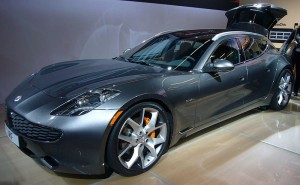A Fisker Surf differs ever so slightly from the Hupp-Yeats electric coach of yesteryear …

In his debut Time Machine blog post for PSMag.com yesterday, Matt Novak looked at the first golden age of electric cars roughly a century ago. That sheen dulled though as the advantages of the internal combustion engine—think range and power—trumped the quiet appeal of battery-powered vehicles.
In a “the more things change”-style report, market researchers GlobalData outline some of the stumbling blocks to the widespread adoption of electric vehicles in the Tesla- and Fisker-influenced modern day. (The report costs a cool $3,995 so forgive us as we link to press releases to explain it.) Global Data argues that electric vehicles continue to come in second to fuel-powered cars “due to factors such as range limitation, occupancy levels and the poor current choice of [battery electric vehicle] models.”
If those didn’t create an uphill road to begin with, the generally higher cost of electrics (average pricetag just south of $40,000 each) and the lack of charging stations (a kind of subset of the limited range issue) makes the climb even steeper, and tends to focus attention on government support as a prerequisite to consumer demand. Still, even in these Solyndra-bashing times, there’s been scattered backing for electric vehicles; GlobalData even talks of a sort of arms race among European governments to see which can be king of the EV hill.
But intentions are not being matched by sales: Britain is spending a quarter-billion pounds to get 1.2 million EVs and 350,000 hybrids on its motorways by 2020. Sales last year? Only 1,100 vehicles. Germany, meanwhile, wants a million on it autobahns by 2020, and France two million.
“However, national BEV aspirations have largely been crushed due to practical issues. For example, Ireland’s plan to deploy 6,000 BEVs by 2012 has been delayed due to suppliers failing to deliver BEV equipment on schedule.”
But hope, or at least shopping, springs eternal. A new report from the Union of Concerned Scientists argues that in addition to reducing those planet-warming tailpipe emissions, American EV owners will save money in the long-haul (assuming they find charging stations along the way):
“Our analysis also concludes that wherever EV owners “charge up,” they can save $750 to $1,200 a year compared with operating an average new compact gasoline vehicle (27 mpg) fueled with gasoline at $3.50 per gallon. At that gasoline price, driving the average gasoline vehicle costs more than $18,000 to refuel over the vehicle’s lifetime, but the owner of an EV can expect to pay thousands of dollars less to power his or her vehicle. Thus, while in this early electric vehicle market these products have higher up-front costs, knowing how much one can save by using electricity instead of gasoline is an important factor for consumers considering an EV purchase.”
So the key to a second golden age for electrics may lie in how much gold we can save.




